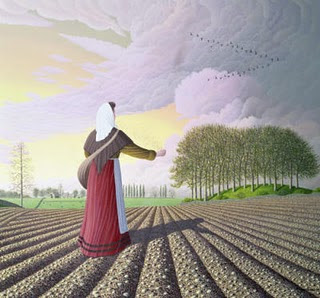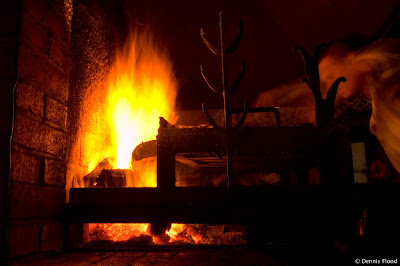Yesterday, it was sunny and warm here in Columbia's district and I raced home from work, past the beautiful Potomac and the fey-thronged Spout Run, to sit in my woodland garden and on my porch. One of my friends who's been center-front in the struggle for workers' rights in Wisconsin called me on his cell phone so I could hear the crowd around Jesse Jackson singing Amazing Grace. We had a great chat (he, on the front lines and I on my porch, mea culpa, mea culpa, mea maxima culpa) and then I went to my ritual room and lit incense for today's election. I'm so proud of D and S and R and J and all of my other friends in Wisconsin. I feel gifted to know them.
I had a "complicated" relationship with my dad, who, much as he wanted to be a man of words, was seldom able to articulate why he loved the things that he loved. And that made him (inexplicably, to a kid) angry. I was sitting directly behind him, in the family station wagon, when the radio announced that Dr. King had been killed advocating the rights of union workers. My dad, who spent his life in the union movement, slumped in the front seat and then yelled at me for something; I don't remember what. What I do remember was knowing that he felt an unrecoverable loss at that moment. I think he understood why it was that Dr. King could challenge almost anything except the refusal to pay Americans a living wage. One of my most treasured pictures is one of him -- a few days later, trying hard to recover himself, outside a neon-sign Memphis church -- taken when he went to cover Dr. King's funeral for his union. Whenever I'm tempted to be angry at him for the way that he raised me, I remember that picture and focus on what was great about him. He came from almost nothing and spent a lot of his life doing what he could for the highest cause he'd found. I don't think that cause was fathering a feminist, but that's (many years later, after a lot of shadow work, turned out to be kind of) ok.
So maybe it's understandable that this video, which brings together my present and my past, through the lens of my dad and my friends, makes me cry.
When I grew up and moved away from home, one of the few ways that my dad and I managed to connect was through my critiques of his writing (and his grudging support of mine). He was still editing a lot of union magazines and newsletters at that point, and I kept pushing him to make them less sexist. (Me: Dad, would this joke be funny if it were about black people? Dad: Well, no. Me: Ok, then why is it funny about women? Dad: OK, you write a better joke. Me: OK . . . .) So the irony of the sexist signs carried in this video, often above a logo that Dad designed, isn't lost on me.
To balance that, and just for my dad, who would have cried at reading it, I'll add this:
Well, children, where there is so much racket there must be something out of kilter. I think that 'twixt the negroes of the South and the women at the North, all talking about rights, the white men will be in a fix pretty soon. But what's all this here talking about?
That man over there says that women need to be helped into carriages, and lifted over ditches, and to have the best place everywhere. Nobody ever helps me into carriages, or over mud-puddles, or gives me any best place! And ain't I a woman? Look at me! Look at my arm! I have ploughed and planted, and gathered into barns, and no man could head me! And ain't I a woman? I could work as much and eat as much as a man - when I could get it - and bear the lash as well! And ain't I a woman? I have borne thirteen children, and seen most all sold off to slavery, and when I cried out with my mother's grief, none but Jesus heard me! And ain't I a woman? ~S. Truth
Women and men need a victory tonight in Wisconsin.
hat tip/ First Draft






